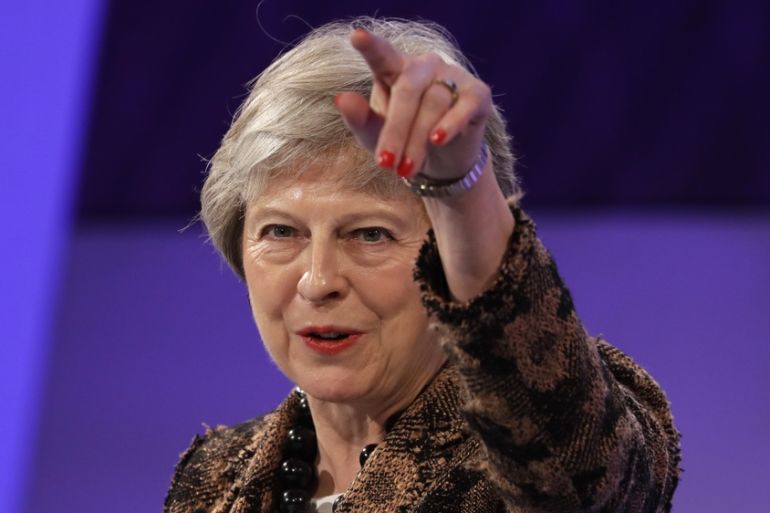Theresa May fights for Brexit deal, says ‘agreed in full’
Several government ministers have pressured the British prime minister to make changes to the withdrawal agreement.

British Prime Minister Theresa May has sought to rally support for her unpopular draft Brexit deal, stating that the agreement means Britain will be “fully in control” of immigration.
Speaking to business leaders in London on Monday, May said that immigration to the United Kingdom would be based on skills and experience, while citizens from the European Union would not have preferential treatment.
Keep reading
list of 4 itemsUS House approves aid package worth billions for Ukraine, Israel
Will India’s election be free and fair?
Togo approves constitutional reform changing how president is elected
“Once we’ve left the EU, we will be fully in control of who comes here,” May said.
“It will no longer be the case that EU nationals, regardless of the skills or experience they have to offer, can jump the queue ahead of engineers from Sydney or software developers from Delhi.”
Since reaching a deal over the terms of Britain’s withdrawal from the EU last week, May’s government has been in crisis, with attacks on the deal coming from all sides.
Several ministers, including her Brexit minister, have resigned over the terms of the agreement while dissenting MPs within her own party have sought to trigger a leadership challenge.
May has vowed to fight on, warning rebellious MPs that removing her from office would not make Brexit easier.
Amid pressure from hardline Brexiters, including members of her cabinet, to make last-minute changes to the deal, May said that it has been “agreed in full”.
The Conservative Party rebels believe the deal leaves Britain in indefinite subjugation to Brussels and also places Northern Ireland in a separate regulatory regime to the rest of the UK.
The dissenting ministers say they want to ensure that the UK does not become trapped in a permanent customs union arrangement with the bloc.
The prime minister also said that the post-Brexit transition phase must end by the time the UK holds elections in 2022.
“I think it is important that in delivering for the British people we are out of the implementation period before the next general election,” she said.
The EU’s Brexit negotiator, Michel Barnier, said on Monday that the union was yet to decide on any extension to the envisaged transition process.
Speaking in Brussels after meeting with EU ministers, Barnier said the Brexit deal is “fair and balanced” and that the 27 EU nations fully support the withdrawal agreement.
“In particular, the member states support the draft withdrawal agreement. The EU side will still have to decide the internal process for agreeing to extend the transition period,” he said.
The transition period is currently due to expire at the end of 2020.
The UK would have to make appropriate contributions to EU coffers if it were to stay in the bloc’s customs union and single market beyond the transition period, Barnier said.
He declined to comment on remarks by diplomats that final end date of December 31, 2022, was being discussed by negotiators.
London and Brussels are still negotiating the outline text of a future relationship once the transition period is over, with talks expected to progress this week.
|
|